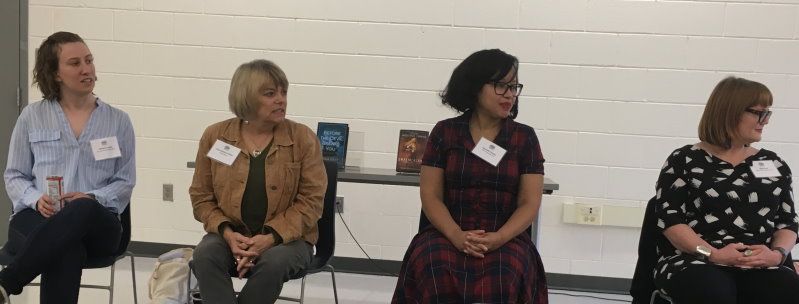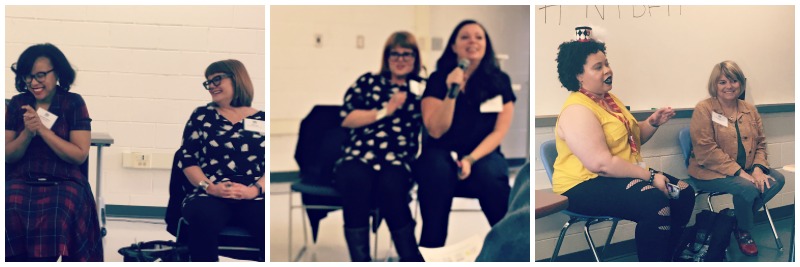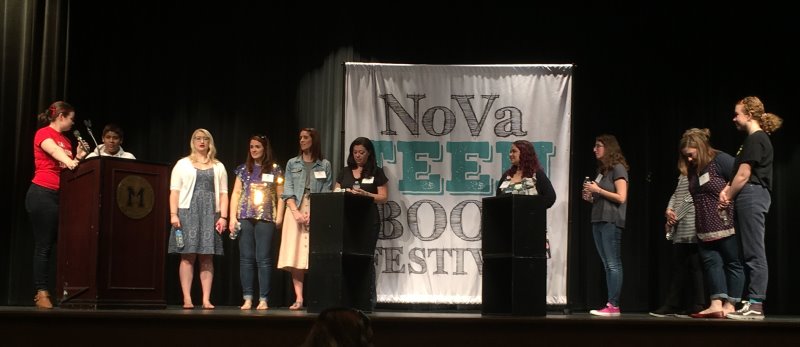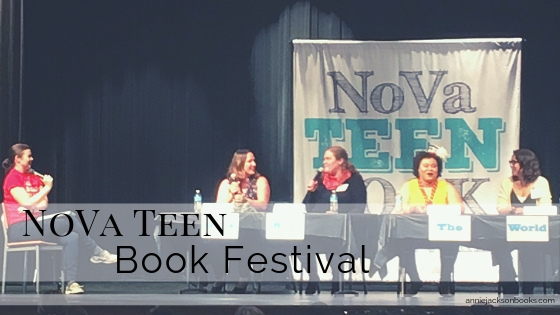NoVaTeen is a book festival put on every year in the DC area by One More Page Books and a couple of county libraries (there’s several counties all clustered together around here). The focus is on YA books and authors and every year it’s a great blend of interesting, serious topics with lighthearted, frivolous fun.
The first panel may have been my favorite all day. Libba Bray, Cinda Williams Chima, Dhonielle Glayton and Katherine Locke got together to talk about magic and world-building in their stories. The hilarious thing is that none of them really have methods to their world-building or magic!
Katherine Locke had one of my favorite quotes when she said that with a draft of The Girl with the Red Balloon her editor asked details about the magic and her reply was, “Why are you asking me questions?!”
For most of the authors on the panel, they write the story with whatever bits of magic fit and then it’s their editors, friends and beta readers who ask questions that give the whole rules thing.
“Rules? Where we’re going we don’t need rules…” – Libba Bray

Dhonielle Clayton said that she starts with the world – which comes out of an idea or an problem she’s trying to solve. And then she finds the character in that world that would start the most trouble – which sounds brilliant.
That inspired Katherine Locke:
Lisa Maxwell was the moderator and she balanced the funny and the serious quite well. I’ve heard her speak at a few different panels and she takes the struggles she’s had with writing her Last Magician series and makes them vehemently amusing. In the midst of the laughs and self-deprecating methodology they had really interesting things to say.
First, I *hate* typos in my tweets – why can’t I edit it?!?!?!
Ok, onto the really important stuff. Since it was a panel on magic a lot of the discussion revolved around why these writers choose to write fantasy and if they’d consider writing contemporary stories.
Libba Bray said that she had always accepted there was magic in the world and she looked for meaning and symbols in it. Which I thought was interesting and agree with because I’ve also always had a sense of the numinous in this world (which I wrote into Tattered Heart).
The actual quote from Cinda Williams Chima is, “I think there are very few stories that cannot be improved with a little bit of magic.”
Katherine Locke had an interesting point that magic has to have rules, but reality doesn’t. Which, could also be another entire blog post with a tangent on Tolkien’s perspective and his idea of an ‘inner consistency of reality.’
Libba Bray said that when she gets stuck she often connects with Holly Black. Libba said she’ll be talking through her plot and at some point Holly will get a look on her face and say, “You could do that…” and Libba immediately knows, “No, I can’t!”
Not sure where that fits into Libba’s writing “process” (which if I were a meme builder of any sort this would be much cooler):
Caffeine
Grandiosity
Despair
Acceptance
Then there were some other fun panels with new authors. But it was one in the afternoon with Cinda Williams Chima and L.L. McKinney that I enjoyed almost as much as the first one. Probably because it was a similar blend of humor and serious writerly answers. I asked L (she said we can pick whichever one we want) why she chose Wonderland and she had a great answer, part of which was that she likes “the idea of nonsense magic. Nothing makes sense except that nothing makes sense.”

Cinda Williams Chima talked a little about how she started writing and I really loved how she expressed it. Before fanfiction or anything of the sort she said, “I was always embroidering stories that I knew and loved.”
(Also, her publisher bought the Heir Chronicles one at a time, which I was going to ask but she included it in an answer before I could.)
Then she talked a little about cinematic writing (movies vs. books) and how in movies you don’t spend time in the character’s head angsting (she might not have said “angsting” I might have made that word up). What you do write in a movie has to be in scene, on stage and apparent. If you take that same philosophy into your books you’ll spend less time angsting and explaining. (That last part is me.)
I feel like I almost want to do an entire blog post on cinematic writing because it connects really well with the idea I’ve been trying to express with The Helion Chronicles when I say that they read like a tv show. They’re not in screenplay format (which is the first thing people think) but they have that cinematic style that is largely dialog, succinct exposition (almost entirely expressed in dialog) and the sense that something has to happen in every scene – whether that’s physical action or character interaction – choices being made – something… I don’t know yet how good I am at it (readers will likely decide that for me) but I’ve been writing cinematically for the past 2 years without the proper way to express it so I really appreciated Cinda’s words.
The next to last panel was all about girls in stories as the heroes. And E.K. Johnston said something that straight up convinced me to buy her book. She said that in Queen’s Shadow she really enjoyed taking all the things people have made fun of girls for and using that – letting them underestimate Amadala/Padme and weaponizing it to use against them. However successful it turns out she is in doing that, I just love the idea so much I had to give her a shot.

Finally, Libba Bray gave the keynote speech and once again she blended humor and sincerity to delight with 12 things she thinks she’s learned.
I think you should look to these other authors as your inspiration and me as your cautionary tale.
“#2 Farts are always funny.
[the audience giggled – including me]
“I rest my point. Also, I made that number 2 on the list.”
“I wanted to be the queen of England because her name is Elizabeth and my name is Elizabeth and that’s how I thought the line of succession worked.”
I can’t recall the number but one of them (maybe #10) disapproved, emphatically, of standardized testing. “What’s important to learn is critical thinking and empathy.” Critical thinking to understand how the system works and question it. Empathy to see how the system affects other people and to make connections.
#9 Do not drop acid and go see the movie Aliens.
Then she told a heartbreaking personal story about how she started writing. “It felt so powerful to tell the truth in at least one place.” And I think the whole audience felt quietly, poignantly powerful with her. “Sometimes the thing that seems like it’s broken you is the thing that makes you.”
